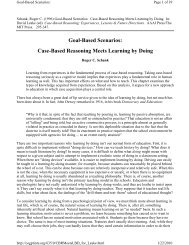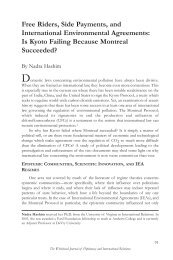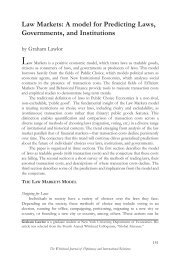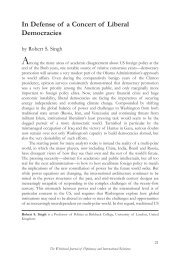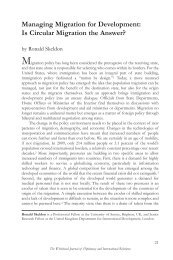Rethinking the Cuban Regime: Implications for Transition Paths and ...
Rethinking the Cuban Regime: Implications for Transition Paths and ...
Rethinking the Cuban Regime: Implications for Transition Paths and ...
Create successful ePaper yourself
Turn your PDF publications into a flip-book with our unique Google optimized e-Paper software.
REThInkIng ThE CUbAn REgIME<br />
maximum leader. The pervasive domination of charismatic versus institutionalized<br />
governance would prove detrimental in making <strong>the</strong> PCC, or any o<strong>the</strong>r state<br />
institution or official, <strong>the</strong> most relevant actor within <strong>the</strong> regime, as will be<br />
demonstrated.<br />
Pluralism continued to be bound to exist within <strong>the</strong> Revolution. As in <strong>the</strong> radical<br />
experiment, political autonomy continued to be rare, <strong>and</strong> political competition<br />
remained very limited, since opposition to prevailing policies <strong>and</strong> ideology was<br />
impossible. All political mobilizations were conducted by <strong>and</strong> <strong>for</strong> organizations loyal<br />
to <strong>the</strong> regime because <strong>the</strong>re was no legal organized opposition allowed. 21<br />
by <strong>the</strong> mid-1980s, <strong>the</strong> effects of <strong>the</strong> market-oriented re<strong>for</strong>ms introduced in <strong>the</strong><br />
early 1970s had alarmed <strong>the</strong> top revolutionary leaders, including Fidel Castro. In<br />
1986, he publicly denounced <strong>the</strong> proliferation of corruption <strong>and</strong> <strong>the</strong> rise of<br />
profiteers among rank-<strong>and</strong>-file workers, managers, <strong>and</strong> even among high-level<br />
government officials. Castro denounced a lack of proletariat conscience among<br />
workers, <strong>and</strong> emphasized <strong>the</strong> need to increase ideological education to workers, new<br />
party cadres, <strong>and</strong> intermediary officials of mass mobilization organizations. The<br />
relative economic liberalization <strong>and</strong> decentralization that occurred during <strong>the</strong><br />
institutionalization process ran counter to <strong>the</strong> precepts of <strong>the</strong> revolution. Thus, Fidel<br />
Castro sanctioned a new program of “moral renewal” <strong>and</strong> economic restructuring:<br />
a rectification process based on <strong>the</strong> return to correct proletariat conscience.<br />
The Rectification Phase (1986-1990):<br />
The rectification process curbed <strong>the</strong> market-oriented re<strong>for</strong>ms that were<br />
implemented during <strong>the</strong> institutionalization phase <strong>and</strong> reaffirmed <strong>the</strong> central role of<br />
<strong>the</strong> PCC. It emphasized <strong>the</strong> importance of correct proletariat conscience <strong>and</strong> mass<br />
mobilization as levers to achieve savings <strong>and</strong> improve productivity. In addition, it was<br />
characterized by <strong>the</strong> preeminence of Fidel Castro’s charismatic leadership <strong>and</strong> a<br />
reversal to <strong>the</strong> practices of <strong>the</strong> radical experiment.<br />
Ideologically speaking, <strong>the</strong> rectification process evoked <strong>the</strong> radical experiment of<br />
<strong>the</strong> 1960s. 22 Despite its rhetoric, though, <strong>the</strong> government aggressively pursued<br />
Western economic ties <strong>and</strong> initiated new <strong>for</strong>ms of economic capitalist ownership,<br />
such as signing joint venture agreements with Western companies <strong>and</strong> increasing <strong>the</strong><br />
number of sociedades anónimas, state agencies that operated with semi-autonomy from<br />
day-to-day budgetary constraints at home <strong>and</strong> abroad, <strong>for</strong> profit <strong>and</strong> hard currency.<br />
As Eckstein points out, <strong>the</strong> process of rectification in actuality deviated from <strong>and</strong><br />
even contradicted its ideological rhetoric. On one h<strong>and</strong>, <strong>the</strong> government resurrected<br />
past moral principles; on <strong>the</strong> o<strong>the</strong>r, it implemented certain re<strong>for</strong>ms <strong>and</strong> allowed<br />
market-oriented practices that undermined revolutionary gains. government policies<br />
aimed at obtaining hard currency <strong>and</strong> address fiscal <strong>and</strong> political concerns. Ideology<br />
was not <strong>the</strong> driving <strong>for</strong>ce of <strong>the</strong> rectification process. 23<br />
Although <strong>the</strong> PCC had acquired <strong>the</strong> basic profile of <strong>the</strong> old communist parties<br />
of Eastern Europe <strong>and</strong> USSR by <strong>the</strong> mid-1980s, it did not achieve <strong>the</strong><br />
institutionalization necessary to steer politics in a different direction. Fidel Castro<br />
www.journalofdiplomacy.org<br />
135<br />
Summer/Fall 2010




